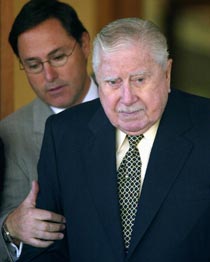(AP File Photo)

If there is an intelligent designer out there of one thing there is no doubt: she has a wonderful sense of irony. What better day to end the life of murderous Chilean dictator Augusto Pinochet than Human Rights Day.
Isabel Allende, deputy of Chile's Socialist Party, daughter of the democratically elected president who Pinochet drove to suicide in the process of taking power Sept 11, 1973 and cousin of the famous novelist of the same name "said her thoughts were with Pinochet's victims, not the dead man."
"Her father...committed suicide in La Moneda presidential palace rather than surrender to the military."
"'The truth is I never expected to see Pinochet in jail," the 61-year-old politician told a news conference in Madrid. 'Neither did it bother me. At 90 years of age it was all the same.'"
"Gen Pinochet took power...more than 3,000 people were killed or 'disappeared' in his 17-year rule.
"He was accused of dozens of human rights abuses as well as fraud but poor health meant he never faced trial.
"No state funeral or national mourning has been authorised. He will be buried with military honours on Tuesday.
"'The government has authorised flags to fly at half-mast at army facilities,' government spokesman Ricardo Lagos Weber said.
"Thousands of anti-Pinochet protesters took to the streets in the centre of the capital, Santiago, with tear gas and water cannon used to disperse crowds."

But Pinochet and his army cohorts did not overthrow Chile's democratically-elected government without help from outside. SF Gate.com reports on Pinochet's closest ally,
"In recent years, declassified U.S. government documents have shown that the Nixon administration began a program to destabilize the Allende government, which had earned President Richard Nixon's wrath by nationalizing U.S. copper mines and other foreign-controlled businesses, rural estates and banks and recognizing Cold War foes of the United States such as Cuba, North Korea and North Vietnam. Led by Secretary of State Henry Kissinger, Washington financed labor strikes, propaganda and military plotters, paving the way for Pinochet's rise to power, some historians have argued. 'It is not part of American history we are proud of,' former Secretary of State Colin Powell said in 2003."
In a discussion this morning with Amy Goodman on Democracy Now , Peter Kornbluh, author of The Pinochet File: A Declassified Dossier on Atrocity and Accountability and a senior analyst at the National Security Archive, a public-interest documentation center in Washington, expanded on Pinochet and the Kissinger/Pinochet link:
PETER KORNBLUH: Well, that he will go down in history along with a pantheon of other deceased dictators -- Francisco Franco, Milosevic, Mussolini -- a man whose name became synonymous with human rights violations. He and the US support for him galvanized the human rights movement in the United States of America, as we know it today. The American public rose up and said, “We don't want our tax dollars to be spent supporting a dictator like Augusto Pinochet,” and they forced Congress to pass laws that restricted Henry Kissinger from giving military and economic aid to Pinochet.
We should remember that Pinochet set the precedent, when he was arrested in London in October of 1998 -- the Pinochet precedent, it's known as now -- that dictators of his ilk can no longer freely travel abroad and think that they have immunity outside of the safety of their homeland. In the future, future dictators are going to think twice before they leave their cities, because Pinochet established that there is a possibility of universal jurisdiction, that many years later, the long arm of international justice and the kind of the tenacity of their victims can track them down and lead to their arrest.
AMY GOODMAN: How did Pinochet rise to power in Chile in 1973?
PETER KORNBLUH: Well, I think, as so many of your listeners know, Amy, that the United States, under the Nixon administration, a policy orchestrated by then-National Security Advisor Henry Kissinger, worked to undermine and destabilize the democratically elected Socialist government of Salvador Allende. The United States helped create the conditions to justify a coup in Chile, create the chaos and instability to promote a Pinochet. There were secret meetings with Pinochet as early as a year before the coup, in which US military officials said to him, “When you’re ready for a coup, we’re ready to help you.” And then, immediately following the coup, the message was passed to him secretly from Kissinger’s office that the United States was going to help in any way for him to consolidate his rule, so his death does remind us of the US role in undermining democracy and supporting dictatorship in Latin America.
U.S. attempts to undermine the democratically-elected governments of Venezuela's Hugo Chavez, Bolivia's Evo Morales, Nicaragua's Daniel Ortega - not to mention what the U.S. has in store for Cuba when Fidel dies - echo the behavior of the U.S. toward Allende's government in Chile.
At some point things have to change, but as we know from the U.S. invasion of Iraq it hasn't happened yet-Dan.
1 comment:
..
absurd thought -
God of the Universe says
admire brutal dictators
absurd thought -
God of the Universe says
don't kill the poor dictator
absurd thought -
God of the Universe says
mourn evil tyrants...
..
Post a Comment